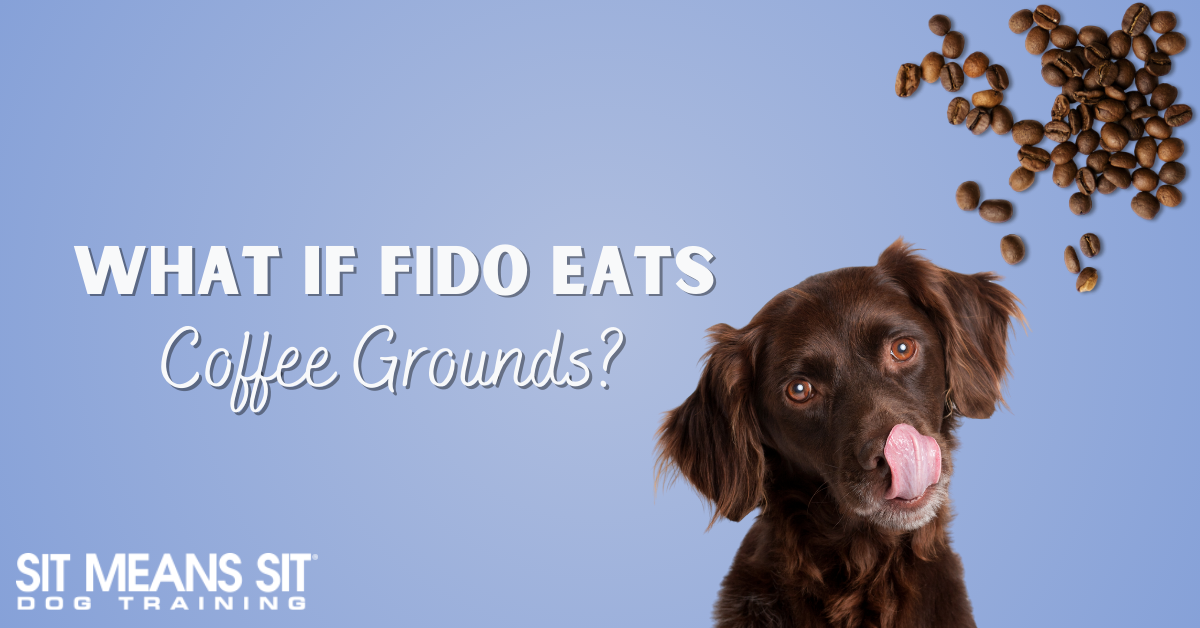Canines are far more sensitive to the effects of caffeine than humans, which is why they can experience adverse effects after consuming moderate amounts of caffeine. If your dog has consumed coffee grounds, they may be at risk for caffeine poisoning. As little as three teaspoons of coffee grounds can adversely affect smaller breeds. Keep reading to learn about how caffeine affects dogs and what to do if your pup has gotten into your coffee grounds.
Can Dogs Have Coffee?
The short answer is no, dogs cannot safely consume coffee. Coffee grounds are toxic to dogs in large amounts due to their high caffeine level. Caffeine is a form of stimulant that can be harmful in high doses. While humans need to consume a lot of caffeine to experience adverse effects, animals are much more sensitive to the effects of caffeine. For this reason, it’s often harmful for canines to consume highly caffeinated products.
Additionally, many ingredients commonly found in a morning cup of coffee are unhealthy or toxic to dogs, including sugar, milk, cocoa beans, macadamia nuts, and the artificial sweetener xylitol. Due to these potential risks, dog owners should keep their pups far away from coffee.
Signs of Caffeine Poisoning
Signs of caffeine ingestion in dogs typically occur within an hour or two of consumption but may start as soon as 30 minutes afterward. Knowing these signs is essential for dog owners so that they can keep their furry friends safe. This information will come in handy if your pup ingests coffee grounds and you are instructed to monitor them for symptoms.
Signs of caffeine poisoning in canines include:
- Hyperactivity and restlessness
- Anxiety
- Vomiting
- Diarrhea
- Increased thirst or urination
- Tremors
- Racing or abnormal heartbeat
- Seizures
Immediate Steps
If you notice that your pup has consumed coffee grounds, take action immediately. The sooner your pup receives the treatment, the less likely they are to experience harmful effects. First, remove any coffee grounds near your dog so they can’t consume more. Next, try to determine how much of the product your dog ate. Collecting information about the quantity and type of coffee grounds consumed will help your veterinarian. Be prepared to also share your dog’s approximate weight and the time frame when they ingested the coffee grounds.
Once you’ve gathered the essential information, contact Fido’s veterinarian or a local animal hospital right away. You can also call a 24/7 animal poison control service, such as the Pet Poison Helpline or ASPCA Poison Control. These experts will be able to determine how much risk your dog is at and give you advice on the next steps to take. With mild cases, they may just suggest monitoring your pup, but if your dog consumed significant amounts, you will likely be instructed to bring your pup into a clinic to be examined.
Treatment
If your dog is displaying symptoms of caffeine ingestion or you know they’ve consumed a large amount of coffee grounds, bring them into a veterinarian’s office or an emergency animal hospital. Treatment for coffee ground ingestion mainly focuses on preventing further absorption of caffeine. The vet may prescribe medication that will induce vomiting to get any remaining caffeine out of the stomach. This method is typically successful if done within a couple hours after ingestion. However, if it has been longer since your dog consumed coffee grounds or they are displaying signs of caffeine toxicity, they may need more advanced treatment.
Dogs with high levels of caffeine in their system may need to be hospitalized. Here, pups will be given IV fluids to keep their hydration level and blood pressure stable, while also flushing the caffeine out of their system. Caffeine can also harm a canine’s kidney, liver, and heart. If a vet suspects your dog is experiencing issues with these functions, they will recommend further testing and treatment. This may include a urinary catheter, blood tests, and or an electrocardiogram (ECG). The sooner a sick dog receives these treatments, the better the chance they will fully recover with no lasting effects.
Things to Keep in Mind
When treating your dog after they consume coffee grounds, always follow the advice of an animal healthcare professional. Never perform any at-home treatments or induce vomiting on your pup unless you are instructed to do so by a veterinarian. Additionally, dog owners should strive to prevent future accidents by keeping coffee grounds out of their dog’s reach. This includes securing garbage cans and disposing of coffee grounds more carefully. Puppy-proofing your home will keep it safer for your pooch and give you peace of mind.
The best way to prevent caffeine poisoning or other adverse effects is to ensure your furry friend steers clear of coffee grounds. Now that you’ve read these tips, you should be prepared to ensure Fido’s safety if they do get into your coffee. Remember, contacting a veterinarian immediately is essential to ensure the best possible outcome for your pup.
Check Out These Related Posts for More Dog Food Safety Tips!
Should I Give My Dog Bone Broth?

